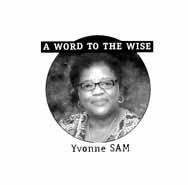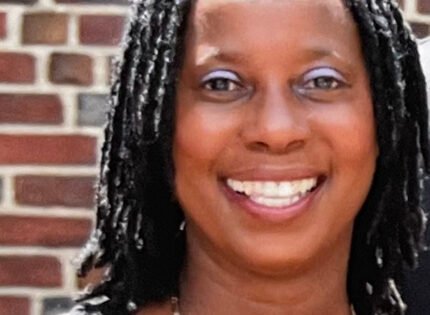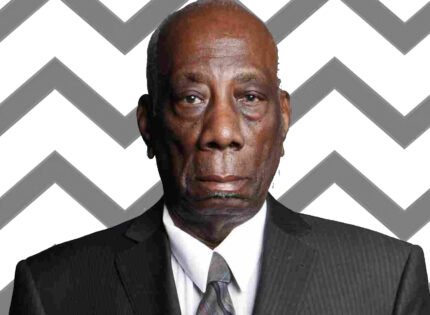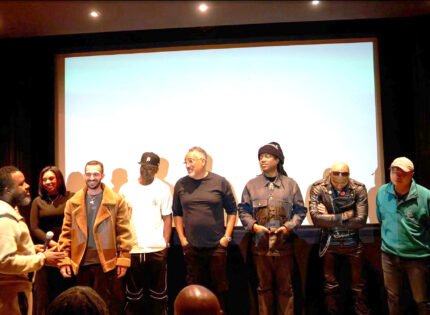 As any other community-minded citizen, I have questions about the way some things are being run and the changes that we can collectively make to keep improving the community.
As any other community-minded citizen, I have questions about the way some things are being run and the changes that we can collectively make to keep improving the community.
So my ultimate goal and ambition is geared towards improvement at large, and in the creation of an ongoing dialogue on ways that we can work together to get this done.
I cringe every time February rolls around, and for me Black History month has become predictable. When we eventually get around to honoring the well-known heroes and heroines, then we dust off the biographies, re-show television documentaries and glorify the works of Martin Luther King Jr, Rosa Parks and Charles Drew, to name a few, so that by the time the end of the month comes we have forgotten what we were meant to be celebrating and move on confident that we have done our duty.
In 1926, when Carter G. Woodson first announced Negro History Week, people still had a very jaundiced view of Africa, as it was being viewed as the so-called Dark Continent, a place that had contributed nothing to world civilization. He wanted the U.S., white Americans, African Americans, indeed the world, to understand that Black people had not been a negligible factor in world history. Carter G. Woodson did not think Black history should be confined to a week, nor was it suggested that it should be confined to a month when it was expanded in 1976.
Black History Month is not meant to only focus on African American experiences and accomplishments in the U.S., but all over the world. What Woodson had in mind was that individuals in America, white and Black, would recognize the role Black people played in world civilization, and would understand the many myths and misconceptions that had been built up around Black people and also wanted to inspire greater accomplishments.
Of significance is the fact that the United Nations (UN) has declared 2015-2024 as the International Decade for People of African Descent, marking a decade of political advocacy to address the racism, discrimination, social, political and economic issues people of African descent throughout the world are faced with.
As a community, and by extension a people, we are bombarded with Canadian history; Black history is a mere footnote. Black History Month, then, is a way for us to remind ourselves of our contributions and furthermore remind the nation that Black history is Canadian history.
As far as Blacks are concerned, we are the only ones who were enslaved, a fact that must always be remembered, also that our forebears were united in the struggle against slavery, oppression and injustice, as they worked towards the common goal of full emancipation.
This past February, I was humbled to be the guest speaker at three different activities, but none of my presentations focused on the great societal epiphany, or corporate Canada’s February attempts to look [fake] righteous with its special brand of civic awareness, or a reflection on the history that has been stolen from the African Diaspora. Instead, I redirected my narratives to ones that were future-focused and geared towards helping listeners understand ourselves as Canadians in the most accurate and complete socio-historical context that we can produce.
Basically, I annexed Black History Month and Black Future Month as one inseparable celebration of Black lives. However, now that Black History Month is out of the way, I am left with some nagging concerns…
On January 19, I attended the official launching at City Hall of Martin Luther King Jr. Day, sadly we could count the number Black of attendees on one hand. [It should be pointed out that the breakfast was sponsored by the Bronfman Family. There’s some truth to the well-known adage, whosoever pays the piper calls the tune.]
To add more insult to injury, the entire event was conducted in French, except for the bilingual welcome speech graciously delivered by Mayor Denis Coderre. Closer to our roots, the Black Coalition of Quebec (La Ligue des Noirs), spearheaded by Dan Philip, held their Black history celebration under the theme “Knowing Us Well for a Better Affirmation.”
On leaving the event, I was left wondering to whom did the theme refer. The term “knowing us well” was ironically translated and converted into the entire event, up to and including even actor participation being conducted in French. No part of the Black history was told in the English language. The mode and manner of current celebrations have made it more blatantly apparent that as a people we cannot unite even for the shortest month in the year, and not let Black History morph into Black mystery.
After all it is the same old story about a marginalized group of people being told by their descendants, who share the same history and cultural identity, so why not let us say it in unison, rather than every splinter group and organization having a say and doing things their own way—separation and segregation.
If there is one thing that conservatism teaches, it is the notion that we must draw upon history as our greatest teacher. Most young people know LeBron James, Kobe Bryant and Carmelo Anthony, but they don’t know the name, Yolande James, Viola Desmond, Jean Augustine, Oscar Peterson, and perhaps with a push P.K. Subban, or Ben Johnson for that matter.
There is little if any communal relationship to the present, and absolutely no linkage to the future. The time is now for us to forge forward together, as we cannot afford to solely commemorate and concentrate on the past.
We would be telling the same story in one voice through transformative inclusive organizing, and in the context of Black History we can then look upon it as Black mastery. It is our inherent duty to live up to the legacy of those who came before us and not allow their sacrifices to go in vain.
Our ancestral struggles and trials should be the underpinning factor shaping all our current commitment to change, and once we have envisioned our future then we must actively bend the arc towards those changes.
Be it known that there is a tendency for too many of us to become engrossed in the recounting of our history, which often amounts to purely intellectual activity without material action. So rather than continue to reinforce our own flawed conceptions of history, we should be having a more inclusive debate with the hope of agreement about our present.
After all, our children need to learn about black inventions, music, politics and philosophy, etc. as they relate to the present in order to build a foundation to reach their tomorrows. So let us determine that united we will forever strive to keep Black History alive, and in so doing stand our ground to ensure that Black History is celebrated all year round.
Aleuta—
The struggle continues…















